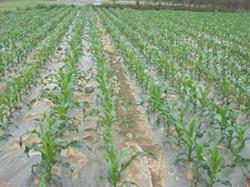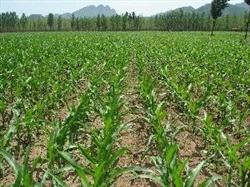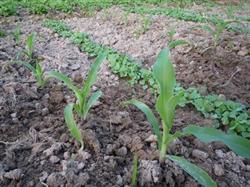Key cultivation techniques of Spring Maize

During the sowing period, the temperature of spring corn is low and unstable, and it is easy to appear the phenomenon of uneven and unstrong seedlings, and the occurrence of rough dwarf disease is more serious than that of summer corn. In order to ensure the high yield of spring maize, we should focus on the following key technologies. Soil preparation and fertilization: choose land with loose and fertile soil, adequate water supply and good drainage for planting. Combined with ploughing and ploughing, base fertilizer is applied, mainly organic fertilizer, so that fertilizer and soil are integrated. Select improved varieties: select Nongda 108 and other varieties with a growth period of more than 112 days, compact plant type and strong stress resistance. Select seeds carefully before sowing, remove small, diseased and blighted seeds, and expose them to the sun for 2-3 days to enhance the water absorption capacity of seeds to facilitate early emergence. Soaking seeds before sowing: soaking seeds in ⑴ warm water: soaking corn seeds in 55 ℃ warm water for 20 minutes, then soaking seeds under the condition of 20-30 ℃ for 6-12 hours. Soaking seeds in warm water can kill the smut pathogen attached to the surface of the seeds. Soak seeds in ⑵ human urine: soak seeds in 30% human urine for 12 hours or soak seeds in 50% human urine for 6-8 hours. Soaking seeds with urine can promote the health of seedlings. Soaking seeds in ⑶ potassium dihydrogen phosphate solution: soaking seeds in 500x solution of potassium dihydrogen phosphate for 8-12 hours can lead to seedling emergence 1-2 days earlier. In addition, soaking seeds with yield-increasing element, ferric molybdate and other solutions also had a good effect on increasing yield. Leave the soaked seeds to dry in a cool place, not in the sun. Plastic film mulching seedlings: plastic film mulching seedlings to increase temperature and moisture, cold areas can be used plastic film and arch shed double film mulching seedlings. Rake flat ridge noodles before sowing, spray Maibao, Yutianjing and other herbicides to control underground pests. Hole sowing, 2 grains per hole, sowing depth 3-7 cm, seed consumption 2.5-3 kg per mu. Break the membrane and release the seedlings in time after emergence, and pay attention to the prevention of low temperature and cold injury when the emergence reaches 70%. Fertilizer and water management: strong seedling fertilizer was applied when seedlings had 3-4 leaves, strong culm fertilizer was applied from 5 leaf stage to jointing stage, and grain fertilizer was applied at 8-9 leaf stage. When sowing spring corn, the temperature is low, the transformation of soil nutrients is slow, and the root absorption capacity is poor, so fertilizer should be applied near the root system to facilitate absorption and utilization. Watering at the right time, the field capacity was kept at 70% at jointing stage and 70-80% at booting stage, and the soil was kept moist from heading to milk stage. Control of diseases and insect pests: the main diseases and insect pests of spring corn at seedling stage are thrips, golden needle worms, mole crickets, grubs, etc., which can be controlled by dimethoate spray in time. The main diseases and insect pests at panicle stage are armyworm, corn borer and stem rot, which can be controlled by Kuailing and carbendazim spray. Timely harvest: the stem turns yellow, the bracts are yellow-white and loose, and the seeds harden. Generally, spring corn in greenhouse is on the market from March to June.
- Prev

The key points of how to plant spring corn well
1. Take measures according to local conditions and select improved varieties. Popularize Yedan 13, Xiyu 3, Huayu 4, Zhongdan 32, Chenghai 1 and Expedition 808 in plain and hilly areas. Yedan 22, Yedan 51 and 9362 with short stem and short growth period are selected for interplanting in cotton fields. Zhongnuo 1 can be planted in suburban areas.
- Next

Key points of Seedling raising and transplanting of Spring Maize
At present, we are about to enter the sowing season of spring corn, so we should do a good job of seedling raising and transplanting in production to promote the early development and stable growth of maize and achieve high and stable yield. For the fields with good varieties to harvest tender corn cobs, the fields with good quality such as Jiangnan Huanuo and Suyunuo should be selected, and Zheng Yu with high yield should be selected for harvesting corn kernels.
Related
- The first cup of black tea in spring, the flavor and history of tea gardens in Kenya, Africa
- The computer can not only choose potatoes, but also grow tea rice. AI will grow winter oolong tea champion.
- It is not only the inflated tea bitten by insects, but also engraved with the four seasons tea in Beipu.
- The Oriental Beauty Tea Festival in Zhuxian County takes the stage at the weekend to experience the plus-size feast of oil tea.
- & quot; Oriental Beauty Tea & Exploration of Emei in Hsinchu, the hometown of quot;
- The new variety of strawberry "Tainong 1" dessert is the first choice with mellow aroma. Crimson gorgeous
- History of Tea in Taiwan: from Wild Inner Mountain to Export Tea Garden
- Two types of Taiwan Oriental Beauty Black Tea won the British three-Star Award for Childhood Tea Xiang Zhang Jiaqi changed from pilot to champion tea maker.
- Banana species and varieties: the planting history of Taiwan Xianren banana and dwarf banana is long, is banana disease resistant?
- Coffee planting Technology: Qianjie Coffee from Seedling to harvesting

